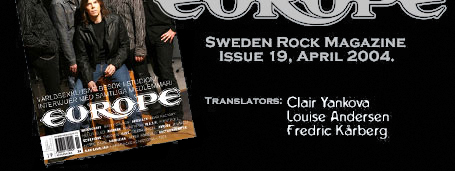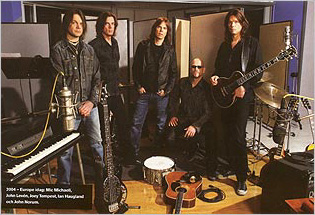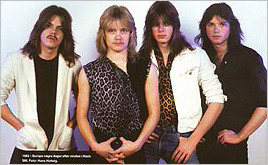

In the leadup to their much-anticipated show at the 2004 Sweden Rock Festival, EUROPE speak of their career past, present and future. This article is taken from Sweden Rock Magazine. Thanks to SRM and all involved with the translations and text!
Article by: Tony Balogh Photos by: Michael Johansson
Please visit https://swedenrockmagazine.com/
Very special thanks to Dimitrios Dimitriadis for permission to reproduce this article.
It's
Time For A New Countdown
Sweden's Biggest Hard Rock Band On Coming Back
The cinema at Rĺsundavagen in Solna (in Stockholm) disappeared a few decades ago and with time was rebuilt into a recording studio. The lounge, where people earlier were sitting in soft deep armchairs, is now accommodating the big studio hall. The control room is approximately on the spot where the old projectionist room used to be. The studio used to be called Soundtrade. Today it goes by the name of Studios 301.
In a way it's a special place for EUROPE since it was upstairs in the kitchen they signed the record deal that eventually led to the international best seller The Final Countdown. The group became the second Swedish band after ABBA to be an international act. It's in Studios 301 that the five musicians in EUROPE and producer Kevin Elson not only are setting the foundations for the 6th studio album but also the foundations for the new beginning of their career.
They are receiving us only three days after the recording started and it's the same night as the Swedish finals for the Eurovision Song contest are held in Stockholm Globe Arena. But EUROPE are already winners. "We are number 2 in the sales chart with a compilation album that really doesn't include anything new. It's fantastic, we're totally surprised," says vocalist Joey Tempest (born Joakim Larsson; August 19, 1963), standing in the studio with guitarist John Norum (born February 23, 1964), bassist John Levén (born October 25, 1963) and keyboardist Mic Michaeli (born Gunnar Michaeli; November 11, 1962). Drummer Ian Haugland (born Hĺkan Haugland; August 13, 1963) [sic] (1964) is sitting behind his drum kit in the big studio-room.
Their appearances don't differ that much from the glory days. Or to quote Tempest when he recently watched the recording of the Rock-SM finals: "We almost look like that today." The only thing missing is the big hair-styles, especially on Ian Haugland who's been bald for several years.
You don't have to spend many hours with the band to realize that these are five friends working. "Back with the old pals," as Norum puts it, and that it's full concentration on the recordings. Twelve working titles have been put up on the wall. "Hero", "American", "Roll", "Sucker", "Underdog", "Faith", "Dark", "Reason", "Flames", "12", "Stop" and "Settle for Love". Judging by the markings on the board Levén and Haugland have in less than two days recorded the basic tracks for almost every song.
"There will probably be less songs on the album," says Ian Haugland. "Today there is so much music pressed in onto an album. Even if there's 16 great songs you can't listen to them all. That's why we're probably gonna record 10 songs and make a strong album."
"It feels great," says Norum and smiles. "I've always thought we had a special chemistry and I've missed that for a long time. EUROPE is the most professional band I've ever been in."
During the time when Sweden Rock Magazine is in the studio, EUROPE records drums and bass for the songs that at least for the moment have the titles "Stop" and "Settle for Love". The latter is a beautiful kind of a ballad but with a larger and more serious depth than what is common in ballads. "Stop" on the other hand is a more straight rock song. The band grew up with 70s rock and Tempest's feeling for sharp melodies together with Norum's love of riffs probably makes the new material melodic but at the same time heavy hard rock. During the interviews we can hear Norum laying rhythm guitar on some of the songs and to say it's got a big sound is no exaggeration. The classic EUROPE sound is updated to 2004 - the last ten to twelve years heavier music is obvious without overshadowing the impression that that band has kept their musical soul. The listener will recognize it but still think it's "here and now."

